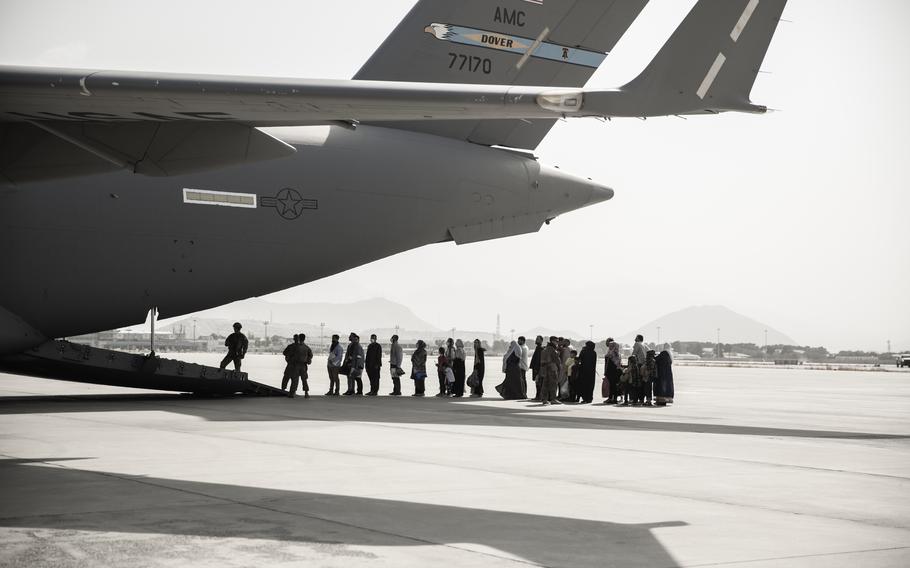
Evacuees wait to board a Boeing C-17 Globemaster III during an evacuation at Hamid Karzai International Airport, Kabul, Afghanistan, Aug. 30, 2021. Approximately 124,000 Afghan citizens were evacuated from Kabul, Afghanistan, during OAR, one of the largest air evacuations of civilians in American history. (Victor A. Mancilla/Marine Corps)
An official watchdog known for his sharp criticism of wasteful U.S. spending in Afghanistan said the Biden administration has stonewalled inquiries about $1.1 billion in humanitarian aid spent “to support the Afghan people since the Taliban’s takeover.”
John Sopko, the special inspector general for Afghanistan reconstruction, said in a report issued late Tuesday night that his office “for the first time in its history is unable this quarter to provide Congress and the American people with a full accounting of this U.S. government spending due to the noncooperation of several U.S. government agencies.”
In “direct violation” of the 2008 law that created the office known as SIGAR, Sopko said, the U.S. Agency for International Development and the Treasury Department “refused to cooperate” at all, while the State Department shared only “high-level funding data.”
USAID and the State Department maintained that the continuing U.S. aid is “humanitarian and development assistance” and not part of the funding that Sopko oversees, according to his report.
A State Department spokesperson said Wednesday that the inspector general’s mandate is to examine U.S. funds for Afghanistan’s reconstruction but that such assistance ended with the Taliban takeover, with the focus now on the humanitarian aid that’s outside Sopko’s mandate. Nonetheless, the spokesperson said, the State Department has provided written answers to dozens of questions, as well as thousands of pages of documents.
In Sopko’s latest quarterly report, he found that current conditions in Afghanistan “are similar to those under the Taliban in the 1990s.”
Among the findings:
-Looking into allegations that former top Afghan officials stole funds as their government collapsed, Sopko concluded that the cash taken from grounds of the presidential palace and loaded into helicopters was probably limited to about $500,000.
-”The humanitarian situation in Afghanistan remained dire,” with more than half of the population in need of aid.
-Women and girls in Afghanistan “now face significant risks including reduced access to education and health care; loss of empowerment, including the ability to be economically and otherwise independent; and heightened personal safety and security risks.”
-Six completed audits by his office of U.S.-funded projects to rebuild Afghanistan found $10.7 million in “questioned costs.”
- - -
Bloomberg’s Tony Capaccio contributed to this report.